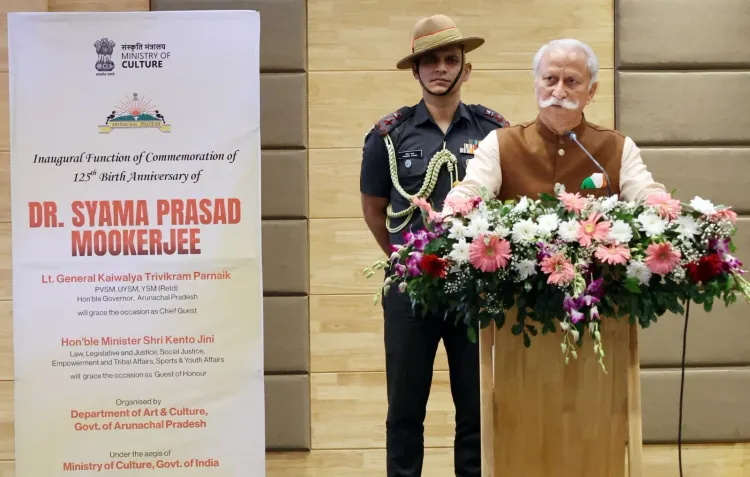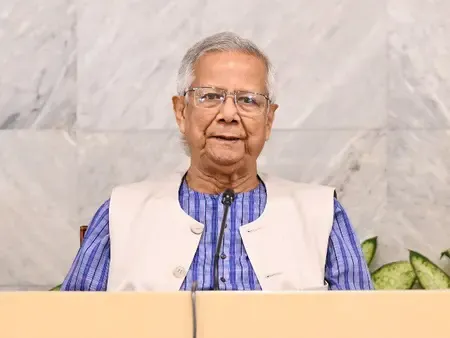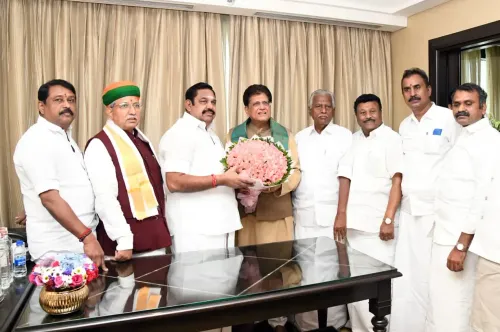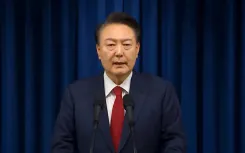How Did Syama Prasad Mookerjee Symbolize Unyielding Commitment to India's Integrity?

Synopsis
Key Takeaways
- Syama Prasad Mookerjee was a pivotal figure in advocating for India's unity and integrity.
- His foundation of the Bharatiya Jana Sangh laid the groundwork for national cohesion.
- Mookerjee's contributions extend beyond politics; he was an esteemed educationist and visionary.
- The fight against Article 370 marked a significant moment in India's political landscape.
- Today’s youth are encouraged to embody Mookerjee’s ideals in various fields.
Itanagar/Imphal, July 6 (NationPress) Arunachal Pradesh Governor Lt. General K.T. Parnaik (Retd) emphasized on Sunday that Syama Prasad Mookerjee exemplified an unwavering dedication to India's integrity, cultural heritage, and democratic ideals.
Manipur Governor Ajay Kumar Bhalla acknowledged Mookerjee’s significant contributions to the nation's development.
During the celebration of Mookerjee's 125th Birth Anniversary in Itanagar, the Arunachal Pradesh Governor fervently addressed the youth of the northeastern region, proclaiming them the torchbearers of Mookerjee's vision.
He asserted that their true strength lies in their talents and aspirations for their community, state, and nation. The Governor encouraged the youth to take immense pride in their rich cultural heritage, arts, languages, and land while also being fearless in excelling in fields like science, sports, technology, innovation, and entrepreneurship.
Lt. Gen Parnaik remarked that Mookerjee was not merely a political figure but a visionary, a respected educator, and a determined nation-builder fueled by a deep conviction in 'One India, Great India'. He established the Bharatiya Jana Sangh in 1951, laying the ideological foundation for national unity and integrity during a time when the country was still recovering from partition.
The Governor recalled Mookerjee's relentless opposition to Article 370 and his emphatic call for 'One Country, One Head, One Flag, One Constitution' in 1953, which marked a crucial chapter in Indian political history.
He highlighted that this dream of equality, national integration, and constitutional unity was realized under the decisive leadership of Prime Minister Narendra Modi and Union Home Minister Amit Shah, particularly with the abrogation of Article 370 and the complete integration of Jammu and Kashmir into the Indian Union.
Reflecting on Mookerjee's significant involvement in the Constituent Assembly, the Governor noted that he consistently championed minority rights and the preservation of regional languages to ensure a Constitution that was inclusive and applicable to all communities.
In Imphal, Manipur Governor Bhalla referred to Mookerjee as a towering figure in modern India's history, a distinguished patriot, freedom fighter, visionary leader, and an intellectual of extraordinary caliber.
As one of the principal architects of independent India, Mookerjee significantly influenced the political and educational landscape of the country, the Governor stated. He was a staunch advocate for national integration and worked tirelessly to uphold the nation’s unity and integrity.
The Governor also remembered Mookerjee’s crucial role in the integration of Jammu and Kashmir. His firm standpoint was captured in his famous assertion: “Ek deshmein do Vidhan, do Nishan, do Pradhan nahichalenge” — demonstrating his steadfast commitment to the principle of one nation, one constitution.
Bhalla urged all to remember and draw inspiration from Mookerjee’s legacy of selfless service, unwavering dedication to national unity, and fearless pursuit of constitutional integrity.










